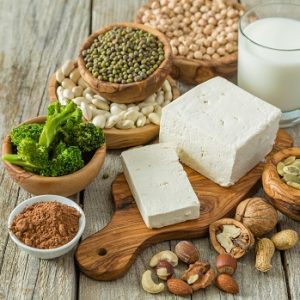
More evidence that low-calorie sweeteners are bad for your health
Studies show that artificial sweeteners can raise the risk of hypertension, metabolic syndrome, type 2 diabetes and heart disease, including stroke.

Natural Health News — Consuming cruciferous vegetables (such as cabbages, kale, collard greens, bok choy, Brussels sprouts, and broccoli) and phytoestrogen-rich foods (such as soya milk, tofu and edamame) could help reduce some common side effects of breast cancer treatment.
Breast cancer survivors often experience side effects from cancer treatments that can persist months or years after completion of treatment. Because many treatments designed to prevent breast cancer recurrence inhibit the body’s production or use of estrogen, a hormone that can fuel breast cancer growth, breast cancer patients often experience menopausal-like symptoms including hot flashes and night sweats, among other side effects.
“These symptoms can adversely impact survivors’ quality of life and can lead them to stopping ongoing treatments,” says Sarah Oppeneer Nomura, PhD, of Georgetown Lombardi Comprehensive Cancer Center, lead researcher of the new study. “Understanding the role of life style factors is important because diet can serve as a modifiable target for possibly reducing symptoms among breast cancer survivors.”
Diet benefits
» Breast cancer treatments often suppress the hormone estrogen, leading to menopause-like symptoms in survivors.
» New research has found that the quality of a woman’s diet prior to treatment, and especially her intake of cruciferous vegetables and phytoestrogen containing foods like soya, can lessen the adverse effects of treatment.
» In women with healthier diets there were fewer hot flashes, less fatigue and a reduction in joint problems, hair thinning/loss and memory problems.
Nomura and her team studied a group of breast cancer survivors that included 173 non-Hispanic white and 192 Chinese Americans including US-born Chinese and Chinese immigrants.
The results, published in Breast Cancer Research and Treatment, showed that higher intake of cruciferous vegetables and soya foods were associated with fewer reports of menopausal-like symptoms (i.e. hot flashes, night sweats, vaginal dryness, and vaginal discharge).
Higher soya intake was also associated with less reported fatigue. Researchers also found suggestive associations with lower reporting of other symptoms, including joint problems, hair thinning/loss and memory less in women who consumed more soya foods, but these benefits were or a smaller magnitude.
When the women in the study were evaluated separately by race/ethnicity, associations were significant among white breast cancer survivors; however; while a trend towards benefit was seen in Chinese women, it was much smaller.
The researchers note, however, that Chinese women typically report fewer menopausal symptoms. In general, Chinese women also consume much greater quantities of cruciferous vegetables and soya foods in their regular diet, making it difficult to see a significant effect in these women. Indeed, in this study, Chinese breast cancer survivors ate more than twice as much soy and cruciferous vegetables.
Phytoactive substances
According to the research team this project addresses an important gap in research on the possible role of lifestyle factors, such as dietary habits, in relation to side effects of treatments.
Phytochemicals, or bioactive food components, such as isoflavones in soya foods and glucosinolates in cruciferous vegetables may be the source of the benefit, researchers say. Isoflavones bind to estrogen receptors and exert weak estrogenic effects, among other effects. Glucosinolates in cruciferous vegetables influence levels of metabolizing enzymes that can modulate inflammation and levels of estrogen, possibly attenuating treatment-related symptoms.
However the researchers note that the reduction in symptoms was likely the result of longer-term consumption of these foods. Results obtained in preclinical studies in animals, for example, show that biologically active compounds present in both soy and cruciferous vegetables cause breast cancer cells to grow, but have opposite effects in animals that consume these compounds well before cancer is diagnosed and continue consuming them during and after cancer treatments.
For this reason women are not advised to simply up their intake of broccoli and soya after a breast cancer diagnosis, but instead think in terms diet as a long-term prevention strategy.

Please subscribe me to your newsletter mailing list. I have read the
privacy statement